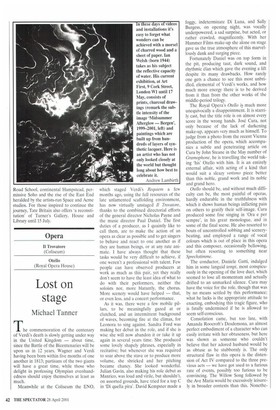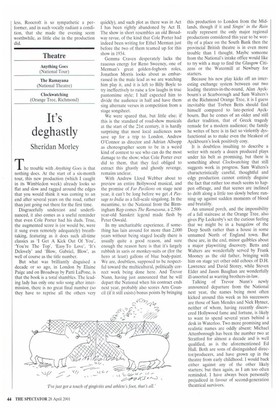Ii Trovatore (Coliseum) Otello (Royal Opera House)
Lost on stage
Michael Tanner
The commemoration of the centenary of Verdi's death is slowly getting under way in the United Kingdom — about time, since the Battle of the Bicentenaries will be upon us in 12 years, Wagner and Verdi having been born within five months of one another in 1813; partisans of the two giants will have a great time, while those who delight in professing Olympian evenhandedness should enjoy themselves at least as much.
Meanwhile at the Coliseum the ENO,
which staged Verdi's Requiem a few months ago, using the full resources of the late unlamented scaffolding environment, has now virtually unstaged 11 Trovatore, thanks to the combined directorial efforts of the general director Nicholas Payne and the music director Paul Daniel. The first duties of a producer, as I quaintly like to call them, are to make the action of an opera as clear as possible and to get singers to behave and react to one another as if they are human beings, or at any rate animate. I have always thought that these tasks would be very difficult to achieve, if one weren't a professional with talent. Few people can have observed producers at work as much as this pair, yet they really don't seem to have the least idea of what to do with their performers, neither the soloists nor, more blatantly, the chorus. More scenery would have helped — that, or even less, and a concert performance.
As it was, there were a few mobile pillars, to be meaningfully gazed at or clutched, and an intermittent background of waves, becoming fire at the climax, for Leonora to sing against. Sandra Ford was making her debut in the role, and if she is wise she will now abandon it or take it up again in several years time. She produced some lovely shapely phrases, especially in recitative; but whenever she was required to soar above the stave or to produce more volume, she shrieked and her pitching became chancy. She looked wonderful. Julian Gavin, also making his role debut as Manrico, was loud and virile, but shouldn't, on assorted grounds, have tried for a top C in `Di quella pira'. David Kempster made a foggy, indeterminate Di Luna, and Sally Burgess, on opening night, was vocally underpowered, a sad surprise, but acted, or rather crawled, magnificently. With her Hammer Films make-up she alone on stage gave us the true atmosphere of this marvellously dank and surging piece.
Fortunately Daniel was on top form in the pit, producing taut, dark sound, and rhythmic élan which gave the evening a lift despite its many drawbacks. How rarely one gets a chance to see this most unbridled, elemental of Verdi's works, and how much more energy there is to be derived from it than from the other works of the middle-period trilogy.
The Royal Opera's Otello is much more unequivocally a disappointment. It is starrily cast, but the title role is on almost every score in the wrong hands. Jose Cura, not only because of the lack of darkening make-up, appears very much as himself. To judge from a photo from the recent Vienna production of the opera, which accompanies a subtle and penetrating article on Cura by John Steane in the May number of Gramophone, he is travelling the world taking 'his' Otello with him. It is an entirely external affair, with acting of a kind that would suit a sleazy verismo piece better than this noble, grand work and its noble and grand hero.
Otello should be, and without much difficulty can be, the most painful of operas, hardly endurable in the truthfulness with which it shows human beings inflicting pain on others to gratify their self-image. Cura produced some fine singing in 'Ora e per sempre', in his great monologue, and in some of the final scene. He also resorted to bouts of uncontrolled sobbing and scenerybeating, and employed a range of vocal colours which is out of place in this opera and this composer, occasionally bellowing, but often resorting to something near Sprechstimme.
The conductor, Daniele Gatti, indulged him in some languid tempi, most conspicuously in the opening of the love duet, which seemed to lose all momentum and actually drifted to an unmarked silence. Cura may have the voice for the role, though that was by no means settled by this performance; what he lacks is the appropriate attitude to enacting, embodying this tragic figure, who is fatally undermined if he is allowed to seem self-conscious.
Consolation came, but too late, with Amanda Roocroft's Desdemona, an almost perfect embodiment of a character who can easily irritate with her obtuseness, but here was shown as someone who couldn't believe that her adored husband would be as obtuse as he stubbornly is. The only structural flaw in this opera is the distension of Act IV compared to the three previous acts — we have got used to a furious rate of events, possibly too furious to be convincing. The Willow Song followed by the Ave Maria would be excessively leisurely in broader contexts than this. Nonethe less, Roocroft is so sympathetic a performer, and in such vocally radiant a condition, that she made the evening seem worthwhile, as little else in the production did.



































































 Previous page
Previous page